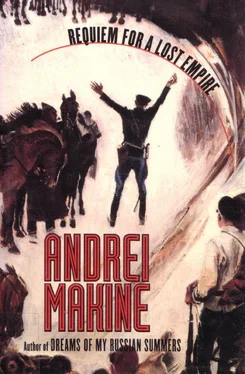Along the trails of war Fox had seen horses drowning, horses ripped apart by shells, a stallion with its front legs torn off attempting to stand up again in a monstrous leap, and a team abandoned in the peaty depths of a bog: the horses sinking deeper and deeper, the prisoners of a useless gun they were hauling. And a White officer, a rope around his neck, being dragged along the ground by a horse gathering speed under the blows of a whip and the bawling of the soldiers. Fox must have understood in his own way that everything happening around him had long since eluded the grasp of these men, as they killed one another, beat their horses, made speeches. He also understood that his master was not fooled.
Nikolai did not seek to judge. Greatly aged over these two years, he was content to reach this very simple conclusion: it was certainly possible to give up plowing and sowing, but then the fields became covered in corpses.
The sleepy filly gently bumped into Fox's hindquarters with her muzzle again, for he had once more imperceptibly slowed his pace. There seemed to be a reassuring aura of happiness about the trust shown by this drowsy young animal. Nikolai inhaled deeply, recognizing the subtle sharpness of the snows hidden in the ravines and the dry scent of the meadows as they gave off the warmth of the day. Night had not yet fallen, to the west the sky was still a translucent purple, but, most important, close in front of them the density of the forest was already lightening, heralding the freedom of the plain and the road that led to Dolshanka. Nikolai coughed and began whispering to himself the questions and answers he was preparing, just to be on the safe side, afraid he might be interrogated about his sudden appearance by some local revolutionary tribunal or, more simply, by curious neighbors.
The story he had composed during his ride passed over one crucial fact in silence. He had fled his regiment because of a machine. An apparatus placed on the big black desk in the building occupied by staff headquarters for the front. Nikolai arrived in this town as a dispatch-rider, with a letter from the commanding officer of their regiment. In the courtyard he had noticed a score of civilians, old men and women with children, guarded by several soldiers. He had been told to wait in the corridor. The door to the office was half open and he could listen to the argument between the commissars. They had to decide whether or not to execute the hostages, the civilians in the courtyard, by way of reprisals. One of the commissars was shouting, "Not till we receive instructions from Moscow." Then suddenly an object sprang into life on the big black wooden desk. It was that strange apparatus around which they were all gathered. Nikolai, his curiosity getting the better of him, peered around the door. The machine was vomiting forth a long strip of paper that the commissars pulled out and read like a newspaper. "There! It's clear now," an invisible voice behind the door had proclaimed. "Read it! 'Shoot them as enemies of the revolution. Display notices in public places…' "
Nikolai had handed over his letter, leaped onto his horse and, as he left the courtyard, had seen the "enemies of the revolution" being led behind the building. He no longer knew how many executions of this type he had already seen during those two years of war. But that white snake coming out of the machine constricted his throat with an anger and a grief that were of a quite different order. He was choking, tugging at the collar of his jacket, then suddenly brought his horse to a halt in the middle of the road and said aloud, "No, Fox, wait. Let's cut off across the fields instead."
To banish this memory, which constantly returned to him, Nikolai reached with his left hand behind his back, to feel the handles of the two new pails fastened to the saddle. Along with several sets of shirts and pants of coarse cotton they were his only spoils. He shook the buckets softly, the zinc made a reassuring, domestic clatter. It was his dream to come back from the war with two buckets, something really useful, and he never wearied of picturing them being carried on a yoke by a young woman, his future wife. There had already been one in his kit, which he had abandoned when he deserted. Going to sleep amid soldiers wandering about in the darkness and horses passing between sleeping bodies, he used to put his head in the pail to protect himself from being kicked by a hoof, which happened from time to time in these nocturnal caravans. And also to ensure it was not stolen. Leaving it behind was his greatest regret at the moment of flight. However, lose one, find ten. Passing through a burned-out village he had found these two new buckets discarded beside the well, at the bottom of which, seeing the swollen face of the drowned man, he had thought he was glimpsing his own reflection. And as he was leaving that place of death he had caught sight of a filly fastened to a tree. She could scarcely remain upright. The grass around the trunk was eaten down to the ground and for as high as she could reach the tree had no bark left. She must have been there for several days.
They would soon be out of the forest. The plain could already be sensed in the last red glow of the sunset through the latticework of the branches. Suddenly Fox repeated his ploy: his head tilted, his eye seeking the rider's gaze. Nikolai scolded him, threatened to sell him at the fair. The horse moved forward, but as if unwillingly. The sandy slope that ought to be opening out onto the intersection of the roads was slow to appear. On the contrary, by the last of the forest trees the road plunged downward, and the horse's hooves made a sucking sound, like cupping glasses. A little farther on old bundles of brushwood crackled underfoot. You could sense the damp of a river close at hand. They must go back up toward the forest and prepare for the night. As he went in among the trees, Nikolai made out a long glade beyond the bushes, whose budding leaves appeared blue in the deceptive transparency of the dusk.
He sensed the danger even before Fox halted. A swift shudder passed across the horse's hide. Fox came to a stop then began backing away in a nervous dance, pushing against the sleepy filly. "Wolves," thought Nikolai and he grasped the butt of the rifle behind his back. The horse continued stamping and snorted jerkily, as if driving flies away. The shadows in among the trees were already too deep, the eye could no longer make out shapes. And the moon, very low, baffled the vision with its milky shimmering. The tree trunks acquired doubles with pallid highlights. As yet invisible, someone or something was watching them.
Fox shied suddenly, dragging the filly along behind him. A black smudge, a scrap of bristling fur, sprang up almost at their feet and disappeared into the underbrush. It was in following the animal's flight that Nikolai lowered his eyes and saw them. At the corner of the glade, in the murky gloaming, these heads emerging from the earth and, closer to the bushes, the shambles of several bodies stretched out on the ground.
Nikolai's first impulse was to turn back, ready to move away, almost reassured by his discovery, less dangerous than an encounter with the living. But, a moment later he thought it would make sense to examine the method of execution and thus to see what he ran the risk of encountering on the road next morning. He leaped to the ground, left Fox, who was still trembling, approached on foot.
Ordering prisoners to dig their own graves and burying them alive -was not uncommon during that war, he knew. What perplexed him, rather, was the anarchic manner in which the killers had acted in this glade. Some of those buried had had their faces slashed with a saber blow, one of them had been decapitated, as if his torment did not suffice. Then Nikolai reflected that the buried men must have begun cursing their enemies as they prepared to leave and thus provoked the massacre. They must also have yelled so as to be finished off, to avoid having to witness the sly circling of wolves around their defenseless heads when evening came. Nikolai imagined their shouts, the return of the soldiers, the coup de grâce, the silence. There were also men shot down with bullets, in haste no doubt, or in a gesture of idleness.
Читать дальше










